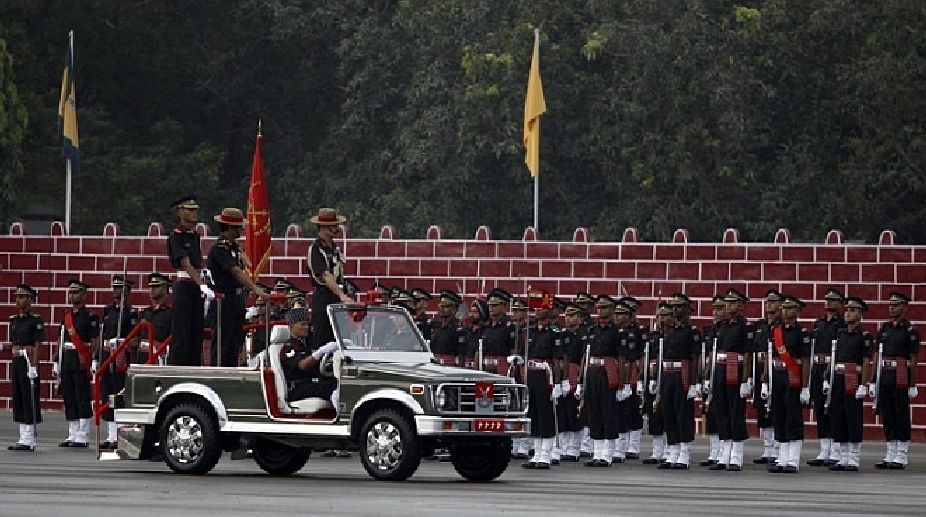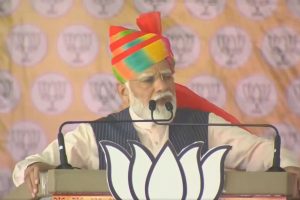The Minister of State for defence, Subhash Bhamre stated in the Lok Sabha last Friday that the combined deficiency of officers in the military was over 9,000, with the army bearing the brunt with a shortage of more than 8,000.
A report released by the UPSC last week also stated that the number of applications received for the Combined Defence Services (CDS) exam, for the military, post college, dropped by almost a third from previous years and is the lowest in four years. In a country where government jobs attract masses, lower number of applicants for the military is worrying. Deficiency in the officer category affects operational efficiency.
Serving in the military was a career of choice up to the 1990s. Youth flocked to join, many lacking qualities which the military desired. With opening of the economy, avenues for employment increased, especially in larger cities and the military as a serious career choice suffered a beating from which it has never recovered. No other central government service has been impacted in a similar manner. It is presently way down amongst choice of careers with the present generation. Every survey places it at seventh or even lower amongst choices.
The military is the only service which advertises in every form of media, desperately seeking volunteers. It offers a variety of options to suit the youth, yet faces shortfalls. Other services neither advertise, nor seek to sell, while the military goes to the level of interacting with students in most educational institutes to garner volunteers. This despite the presence of NCC in schools and colleges down to grassroots levels. The NCC which should have been a base for enhancing interest in and selling the military has been a dismal failure.
Presently, seats in training academies remain unfilled and numbers of those seeking voluntary retirement increase, thus resulting in the military struggling to maintain a minimum number of officers in every establishment, affecting efficiency. Second generation officers, who formed the bulk, now pursue more lucrative careers. This despite the military being a respected service with enviable facilities. The shortfall remains a serious concern as there is no lateral, every individual commencing his career from the lowest rung.
If the military in the eyes of the public is considered a risky choice, this may not be entirely true. Those who attempt to join even today do not consider risk to be a deciding factor. It may be for those not familiar with its functioning or single-child parents, but not for the majority.
For those seeking a ‘life less ordinary’ and adventure, the military is most ideal. If it is emoluments, then it is reasonably good. The pay commission may not have been implemented, however, it remains a government service with medical, rations, housing and other social and security benefits. In fact, amongst all central services, the bonding within the military community, serving and retired, is outstanding. It is the only one which takes care of those who once wore the uniform till the end.
As far as its prestige is concerned, it remains a respected service, irrespective of adverse media publicity in recent times. The uniform, always a lure for the younger generation, distinguishes a soldier anywhere and he would always be respected. The ribbons which adorn a soldiers’ chest catch the eye of everyone in the vicinity. It is only a military officer, who introduces himself prefixing his rank which irrespective of what it is makes him proud and distinguishes him from the rest. The military is losing its charm in a changing society. The present generation seeks quick financial gains, a comfortable working environment with fixed timings, rather than hard work in difficult terrain under challenging conditions. Thus, we are witness to a softer generation, more accustomed to a couch than the mountains. Hence, other career options appear more lucrative.
Civil services have always indicated true power, therefore would always remain more attractive. The military has also witnessed negative publicity in recent years. High supersession, early retirement ages, lack of second career options, increased casualties in operational areas and reports of corruption are some reasons for motivated youngsters choosing alternate careers. The media which was once supportive has begun targeting the military relentlessly, further impacting its image in the public eye.
A major cause for high rejection of candidates has been the military’s selection procedures. In every other career, other than a written exam, there is an interview or at the most a group discussion. This is because the job profile does not entail special qualities of leadership and mental robustness which the military specifically desires.
It follows a four-day stringent Services Selection Board (SSB) assessment. Only those who possess the right qualities qualify and the balance are rejected. Thus, while it still chooses the best, it lacks numbers of the right quality to make the choice from. Irrespective of shortfalls, this selection system cannot and should not change.
Since there is no lateral intake, options to make up the deficiency remain limited. Common options including promoting from the rank and file, enhancing attractiveness of service conditions, enticing youngsters to join for a few years before they move on to civilian street (short service), as also increasing vacancies in the women cadre, have all been attempted. None has truly worked and the shortfall has only increased, a worrying state for the top leadership.
The military desperately needs an out-of-the-box approach, failing which shortfalls could become unmanageable. Those seeking solutions to enhance intake are the generals, while those they seek to attract are youngsters, more than a generation apart.
Hence an option could be to directly involve those present in academies to provide solutions for projection in the correct perspective. The NCC, which should be responsible for enticing the young, should be staffed with motivated officers capable of inspiring youth, rather than be a dumping ground for the disillusioned or those nearing retirement. Most importantly, it should never lower its selection standards, as its role and task require specific qualities, vastly different from every other job profile.
The writer is a retired Major-General of the Indian Army.











